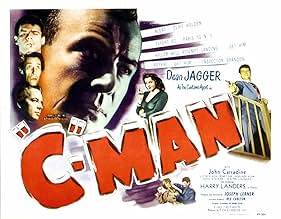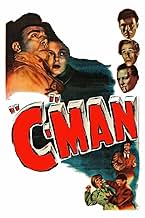A Treasury Department agent is murdered. His best friend, a fellow agent, investigates and stumbles into a scheme involving smuggling and murder.A Treasury Department agent is murdered. His best friend, a fellow agent, investigates and stumbles into a scheme involving smuggling and murder.A Treasury Department agent is murdered. His best friend, a fellow agent, investigates and stumbles into a scheme involving smuggling and murder.
Walter Vaughn
- Customs Inspector Brandon
- (as Walter Vaughan)
Cindy Adams
- Unknown
- (uncredited)
Walter Brooke
- Joe
- (uncredited)
Jean Ellyn
- Birdie Alton
- (uncredited)
- Director
- Writer
- All cast & crew
- Production, box office & more at IMDbPro
Featured reviews
When his best friend is murdered in pursuit of jewel smugglers, customs agent Dean Jagger finds himself assigned to track down the killers and close the case. He flies to Europe in order to catch a return flight on which a chief suspect (Réné Paul) will be traveling. Before boarding, Jagger makes the acquaintance of a war-bride (Lottie Elwen), journeying to America to join her fiancé.
During the night flight across the Atlantic, Elwen falls `ill;' (she's been drugged on board by soused-up sawbones John Carradine, working for the smuggling ring). From the airport, she's whisked away in a hijacked ambulance, wearing a priceless necklace. There's a traffic crash, and she escapes to flee (she thinks) to her waiting fiancé; alas, the groom-to-be has been murdered as well, by one of Pauls myrmidons, vicious hothead Harry Landers. Jagger meets her there, thinking she's an accomplice; when he comes to trust her, he goes undercover to penetrate the operation....
C-Man is a New York story told in the warts-and-all, in-your-face style of the following year's The Tattooed Stranger or Guilty Bystander (the latter also directed by Joseph Lerner) a low-down, dirty town. The location shooting takes us to as many liquor stores as Ray Milland patronized in The Lost Weekend (Jagger is tracking down Carradine, who has a taste for pricey Benedictine), to jazz cellars and fleabag hotels (the one `penthouse' we visit is dowdily middle-class). Part of the grunge can be laid to a desperately low budget, but the filmmakers turn their liabilities into pungent atmosphere.
They also take some chances. One bludgeoning murder in this unusually brutal movie turns almost abstract, like an experimental film; the striking score by Gail Kubik (who by the way is male) evokes mid-century avant-garde classical music of the `academic' school or even third-stream jazz. The low-voltage Jagger, unfortunately, is a bit long in the tooth for the derring-do, and four-square for the lippy repartée, required of him. But beneath its tacky veneer, C-Man shows an unexpected grittiness and audacity.
During the night flight across the Atlantic, Elwen falls `ill;' (she's been drugged on board by soused-up sawbones John Carradine, working for the smuggling ring). From the airport, she's whisked away in a hijacked ambulance, wearing a priceless necklace. There's a traffic crash, and she escapes to flee (she thinks) to her waiting fiancé; alas, the groom-to-be has been murdered as well, by one of Pauls myrmidons, vicious hothead Harry Landers. Jagger meets her there, thinking she's an accomplice; when he comes to trust her, he goes undercover to penetrate the operation....
C-Man is a New York story told in the warts-and-all, in-your-face style of the following year's The Tattooed Stranger or Guilty Bystander (the latter also directed by Joseph Lerner) a low-down, dirty town. The location shooting takes us to as many liquor stores as Ray Milland patronized in The Lost Weekend (Jagger is tracking down Carradine, who has a taste for pricey Benedictine), to jazz cellars and fleabag hotels (the one `penthouse' we visit is dowdily middle-class). Part of the grunge can be laid to a desperately low budget, but the filmmakers turn their liabilities into pungent atmosphere.
They also take some chances. One bludgeoning murder in this unusually brutal movie turns almost abstract, like an experimental film; the striking score by Gail Kubik (who by the way is male) evokes mid-century avant-garde classical music of the `academic' school or even third-stream jazz. The low-voltage Jagger, unfortunately, is a bit long in the tooth for the derring-do, and four-square for the lippy repartée, required of him. But beneath its tacky veneer, C-Man shows an unexpected grittiness and audacity.
The reviews for "C-Man" are mostly very positive. However, I just saw it as a cheap little film with a ton of plot holes.
When the film begins, Treasury Agent Cliff Holden (Dean Jagger) learns that his good friend and fellow agent had been murdered. He vows to find out who's responsible and bring them to justice. Cliff blindly blunders from one situation after another where he SHOULD be killed but again and again he inexplicably survives...and there is no logical reason he isn't killed. Any film that relies this much on dumb luck and dumb criminals is second rate...and this one sure is. Additionally, some of the acting and cinematography is very second rate. In fact, nothing in particular stand out in this one, though Dean Jagger's toupee is very nice. Otherwise, I wouldn't bother with this limp little thriller that offers few thrills.
When the film begins, Treasury Agent Cliff Holden (Dean Jagger) learns that his good friend and fellow agent had been murdered. He vows to find out who's responsible and bring them to justice. Cliff blindly blunders from one situation after another where he SHOULD be killed but again and again he inexplicably survives...and there is no logical reason he isn't killed. Any film that relies this much on dumb luck and dumb criminals is second rate...and this one sure is. Additionally, some of the acting and cinematography is very second rate. In fact, nothing in particular stand out in this one, though Dean Jagger's toupee is very nice. Otherwise, I wouldn't bother with this limp little thriller that offers few thrills.
The few who know this film are probably either hardcore film-noir completists or hardcore John Carradine fans who must have every film "the master" appeared in. I'm glad I recently had an opportunity to view the film, because it is a fascinating independently-made crime-noir film with a number of unique touches. Most of the film is shot either on location on the streets of New York or in VERY small low-budget sets. The location shooting is quite interesting, using unexpected camera angles and giving the film a kind of documentary feel--one suspects that director Joseph Lerner and cinematographer Gerald Hirschfeld were familiar with the Italian neo-realists. I could watch hours of this kind of footage, capturing 1949 New York, as it was experienced by people on foot, through great low-angle shots. And the musical score, by Gail Kubik, is quite avant-garde--sections of it sounding like early John Cage or Stan Kenton at his most atonal. Ms. Kubik was obviously a fine composer who adapted her avant-garde music well to a crime film--I'm anxious to hear some of her other work. Dean Jagger is not the most convincing tough guy, but he is a good enough actor to handle the expository dialogue and unnecessary voice-overs and make them sound SOMEWHAT natural! Lottie Elwen, playing a woman from Holland whom Jagger meets and who gets the mystery, such as it is, in motion, is quite seductive and was an excellent choice for the role. John Carradine can create a distinctive supporting character in his sleep, and once again he does that here as a fallen, now-crooked doctor who has had his medical license revoked (he's only in a few scenes). We should, with hindsight, give credit to the filmmakers who were obviously working on a VERY low budget, yet created a distinctive looking film and a film with lots of atmosphere. Fans of obscure noir-crime films should seek it out; although it's certainly not a flawless classic, there's something real and raw and spontaneous about it, and that quality transcends any other limitations the film has.
Here's one of those B-movie nuggets that makes sifting through the dregs worthwhile (quite appropriate for a tale of jewel smugglers). I'm sure it's exactly the kind of edgy, low-budget genre-piece that inspired Godard and Truffaut to create "Breathless" and "Shoot the Piano Player".
Like its near namesake "T-Men", the heroic semi-documentary frame limns a brutal, cynical noir with striking location shooting. The narrative keeps throwing us curveballs, and the tight, off-kilter framing, low-key lighting and nervy editing emphasize the randomness of the violence and the desperation of the denizens of this demimonde. Most arresting is the frantic free-jazz score, presaging Miles Davis's improvised work for "Lift to the Gallows".
The characters are idiosyncratic and played with verve. Like several other late noirs, there is an undercurrent of homosexuality among the henchmen, and John Carradine's quack doctor is addicted to Benedictine, of all things. A great, offbeat, late-night view.
Like its near namesake "T-Men", the heroic semi-documentary frame limns a brutal, cynical noir with striking location shooting. The narrative keeps throwing us curveballs, and the tight, off-kilter framing, low-key lighting and nervy editing emphasize the randomness of the violence and the desperation of the denizens of this demimonde. Most arresting is the frantic free-jazz score, presaging Miles Davis's improvised work for "Lift to the Gallows".
The characters are idiosyncratic and played with verve. Like several other late noirs, there is an undercurrent of homosexuality among the henchmen, and John Carradine's quack doctor is addicted to Benedictine, of all things. A great, offbeat, late-night view.
Customs agent Dean Jagger (Cliff Holden) goes on the trail of a necklace and a killer. He is the C-Man.
The film moves along at a quick pace and if you just go with it, it carries you along. Unfortunately, it is a little confusing at times and because the picture quality has deteriorated, some dramatically filmed sequences are confusing instead of effective. John Carradine (Doc Spencer) plays a drunkard - it's his look that carries it off for him, not particularly his acting, although he probably wasn't acting! The soundtrack alternates between the over-dramatic and the jazzy art-house cool that suggests experimental film.
There are some very fake punch-ups that run alongside disturbing violent incidents. Make sure that your bed-knobs don't unscrew! The night club scene is also slightly embarrassing - terrible song, unrealistic audience and some poor acting.
Overall, the film is watchable - it should be better, though. Maybe a re-make?
The film moves along at a quick pace and if you just go with it, it carries you along. Unfortunately, it is a little confusing at times and because the picture quality has deteriorated, some dramatically filmed sequences are confusing instead of effective. John Carradine (Doc Spencer) plays a drunkard - it's his look that carries it off for him, not particularly his acting, although he probably wasn't acting! The soundtrack alternates between the over-dramatic and the jazzy art-house cool that suggests experimental film.
There are some very fake punch-ups that run alongside disturbing violent incidents. Make sure that your bed-knobs don't unscrew! The night club scene is also slightly embarrassing - terrible song, unrealistic audience and some poor acting.
Overall, the film is watchable - it should be better, though. Maybe a re-make?
Did you know
- TriviaBased on his 'C'-Man film score, composer Gail Kubik's Symphony Concertante was awarded the Pulitzer Prize for Music in 1952.
- GoofsBoss tells underling to dial Beekman 9-3425. He only dials six times instead of seven.
- SoundtracksDo It Now
Written by Gail Kubik and Larry Orenstein (as Larry Neill)
- How long is 'C'-Man?Powered by Alexa
Details
- Runtime1 hour 15 minutes
- Color
- Sound mix
- Aspect ratio
- 1.37 : 1
Contribute to this page
Suggest an edit or add missing content












